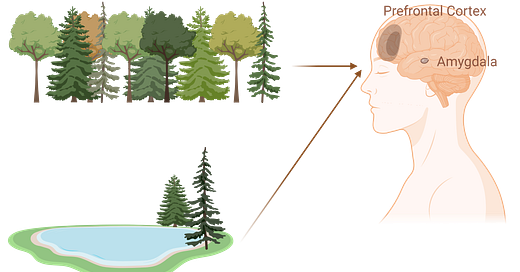Hey Brain Rewirers,
Welcome to this weeks newsletter! This week we’re leaving the house and going into nature. Let’s chat about Attention Restoration Theory.
Attention Restoration Theory
Attention Restoration Theory proposes that time spent in nature can improve concentration and mental fatigue1. The brain can focus on specific tasks through a network involving the prefrontal cortex and the thalamus which sensory attention2. However, we know that at a certain point, we become cognitively fatigued, and performance decreases3. This is why when we talked about productivity, I mentioned techniques like the Pomodoro Method, which call for regular mini-breaks to allow the brain to rest.
ART suggests that looking at nature encourages effortless brain function, allowing cognitive recovery4. A recent systematic review found that many studies find benefits of being in nature. However, some studies did not show benefit. This suggests we still don’t understand which types of attention benefit from nature5. This is not totally surprising: more than three brain networks are important to different aspects of attention6.
Let’s dive in.
Attentional Fatigue
Attentional fatigue is important because it is associated with poorer decision-making and lower levels of self-control7. This can affect obvious things like driving8 and work, but it can also affect our health9! Decision-making and self-control are central to our ability to exercise, eat healthily, and do things that make us happy. Attentional fatigue biases us towards sad stimuli10 and makes it difficult to remain motivated, a crucial factor for obesity11.
We need to find ways to restore our attention when we experience attentional fatigue.
Nature
We see that exposure to nature leads to better cognitive performance compared to exposure to urban environments12. This occurs even after we’ve exhausted our working memory13, and is aided by both the visual aspects of nature and the auditory aspects of nature14. And this restoration is even observed at the level of brainwaves: we see that watching videos of nature leads to the physiological restoration of alpha brainwaves15.
Why?

Evidence shows that one hour of exposure to nature leads to decreased amygdala activation, the centre for fear and stress16. There is also a decrease of activity in the prefrontal cortex, the area responsible for detecting attention, supporting the idea that nature gives the brain a break17. The biophilia hypothesis suggests that because our ancestors evolved in the natural world, we are genetically predisposed to be attracted to nature18.
Whatever the reason, if you’re feeling stressed or mental fatigue, I highly suggest a walk outdoors! That’s why I bought a farm 😊
Brain Health Optimisation
While we’re on the topic of brain health, I had an exciting request for any supplements that I recommend to support our mental health. Getting into nature, getting exercise, and getting enough sleep is crucial to mental wellbeing. But so is our diet!
The goal with our meals should be to get all the vitamins and minerals we need, and when thinking about supplements, we should first consider where we can change our diet to get these nutrients. We should also consider getting a blood test if we’re unsure about what we need!
The nutrients I highly recommend making sure you get enough of to care for your mental health are:
*Disclaimer: If you’re having anxiety or depression symptoms, or any other struggle with mental health, please talk to your doctor! This post is purely educational and not medical advice.*
Omega-3’s - This can be found in your diet (19), typically in fish, and sometimes in nuts and seeds. This can make it difficult to get enough Omega-3’s if you’re vegetarian, vegan, or allergic to shellfish. We know that Omega-3 fatty acids are critical for normal brain function, however, there is inconclusive evidence about the effect of Omega-3s on depression and anxiety (20,21).
Magnesium - This one can also be found in your diet (22): eat leafy greens like spinach, nuts, seeds, and whole grains! There are still ongoing investigations to confirm the full impact of magnesium on mental health, but new studies show that eating magnesium is associated with larger brain volumes (23).
Vitamin D - We cannot get this one through our diet as it comes from the sun, so if you live in a grey country like England (24), I would recommend taking supplements for it! Although this is important for our brain health, always check with a doctor if you’re feeling unwell (25).
Creatine - This we can get from meats, and is made within our liver, kidney, and pancreas, so it’s really important to consult a doctor about if you need supplements, and if so, the right dose for you. There is preliminary evidence for creatine in exercise performance, heart disease, and COPD (26).
Until Next Week,
Nicole x
P.S. Leave a comment with requests for future newsletter topics!
References
(Kaplan, 1989, 1995)
https://www.nature.com/articles/s42003-023-04527-5?fromPaywallRec=false
https://www.sciencedirect.com/science/article/pii/0272494495900012
https://www.tandfonline.com/doi/pdf/10.1080/10937404.2016.1196155
https://www.sciencedirect.com/science/article/abs/pii/S1369847817306228
https://evidence.nihr.ac.uk/alert/increasing-omega-3-intake-does-not-prevent-depression-or-anxiety/
https://ods.od.nih.gov/factsheets/Magnesium-HealthProfessional/
https://www.nhs.uk/conditions/vitamins-and-minerals/vitamin-d/
https://link.springer.com/article/10.1007/s00429-019-01840-w
https://www.mountsinai.org/health-library/supplement/creatine



